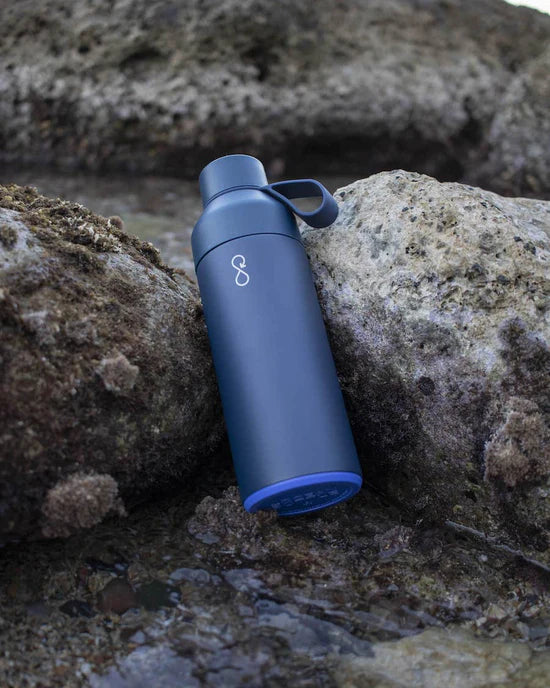It sucks when you come face to face with photos and videos of plastic pollution harming animals, some of the world’s most beautiful beaches or even an area that has special meaning to you. What if I told you that it could soon be a problem in the most isolated place on Earth, The Antarctic?! Surely not right? We can’t have messed up that bad. It’s like the sibling who did nothing wrong getting the blame.
Environmental scientist Kirstie Jones-Williams from Exeter University is leading a group of passionate individuals to collect data on microplastic presence in the Antarctic. The results from this will help to understand the plastic pathway to these remote areas and with a clearer understanding, could push authorities to put stricter policies in place to help prevent this from continuing.
How we’re getting involved
We’ve armed a team of individuals with Ocean Bottles ahead of their trip to Antarctica. We are proud to be a partner and support this type of work as this expedition fits perfectly with our company vision to help rid the oceans of plastic and encourage public understanding. Stay tuned on our social or more pics of the bottles in action.
For me, this goes deeper than cobranding bottles. The prospect of participating in this expedition excites me a lot, to the extent I applied to be part - didn't get in though, lol. Hey Airbnb if you're reading this, gutted! I am a recent Marine Biology graduate with 22 years of experience in loving the oceans and to be honest with you, the mess we are in just frustrates the hell out of me. This is a hugely important research project, coming home with evidence of further damage we’ve caused could instigate another wave of public awareness much-like the video of the turtle and plastic straw did. I don’t believe people don’t care, I believe people just aren’t quite aware of the reality and we need to work hard to make them aware.

Why Antarctica?
The Antarctic, ‘devoted to peace and science’ is one of the most interesting and significant places on Earth and is also home to some incredible wildlife. The study of this continent aids scientists in understanding a holistic view of global climate and operational systems. Ice core analysis which is the process of drilling samples from ice glaciers or ice sheets and studying its's layers allows scientists to gather thorough climate change records and possible causes. This is possible as ice traps tiny air bubbles, acting as samples of the atmosphere at that time and allowing scientists to understand gas concentrations, temperature and environmental cues from previous years.

One misconception people have is the idea that the Antarctic is pristine and free of damage; this is not the case. Unfortunately, although it has no human natives, studies have presented threats such as microplastics, disease, reduced sea-ice cover, ocean acidification and, hunting. Another threat is caused as a side effect to its extremely cold temperatures creating a gradient with the rest of the planet. Pollutants produced in other areas of the earth travel down this gradient to the coldest place (the poles) and are deposited here in the ice and consequently up the food chain. These vital studies must be continued to regulate the monitoring of these threats to find a way to prevent them and educate others.
What do we currently know and, how we as individuals can help
To date, scientists have found microplastics in 114 marine species of which over half end up on our dinner plates. Microplastics have also recently been found in Arctic snowfall and ice. Krill (a vital food source for whales) scrape off ice to feed of the algae packed within it, flooding the ice with plastic could have further implications for marine animals and even humans further down the food chain! If found in the Antarctic, penguins and other birds could be impacted through altered feeding behaviors, absorption of toxins and even terminating regular digestion of food, causing them to feel full on a diet of plastic.
It’s a complex problem because it’s almost impossible to live a completely plastic-free lifestyle. This is why it is vital we vote with our wallets to help turn off the plastic tap; that is to say, we can opt to buy slightly more expensive products made from upcycled plastics, we can choose to not buy vegetables packaged in plastics and we can buy the somewhat dearer biodegradable wipes or, none at all! Sainsbury's now promise to reduce their plastic by 50% by 2050 after pressure was applied by over 100,000 costumers. That's definitely a result, however as we have said before, real change will come from industries and governments.
The discovery of microplastics in sea-ice and snow in the Arctic as well as research highlighting concerns over a contaminated atmosphere stresses how important it is this research is continued so we can effectively act upon it. If plastic is present in high quantities in Antarctic interiors, this could be eye-opening for many as Antarctica reflects the health of the planet. We really must start to worry if this isolated environment is in trouble, this will tell us something nothing else can.

If there’s one thing we all share in common, it’s this planet; our home.
Surely our second thing in common should be our passion and dedication to protect it.
Message in a bottle brought to you by Emily




